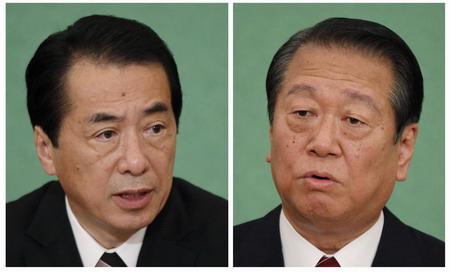Asia-Pacific
Japan PM candidates woo swing MPs before vote
(Agencies)
Updated: 2010-09-13 11:27
 |
Large Medium Small |
|
 A combination picture shows Japan's Prime Minister Naoto Kan (L) and Japan's ruling Democratic Party former secretary general Ichiro Ozawa speaking during a political debate ahead of the party leadership election at the Japan National Press Club in Tokyo September 2, 2010.?[Agencies] |
TOKYO -- Japanese Prime Minister Naoto Kan and powerbroker Ichiro Ozawa are making their final efforts on Monday to woo undecided lawmakers a day before a cliffhanger ruling party leadership vote that may set fiscal priorities.
The winner faces the task of keeping a split Democratic Party of Japan (DPJ) from unravelling while struggling with a strong yen, a fragile economy, huge public debt and a divided parliament that threatens more policy deadlock.
The two have different recipes for the economy, with Kan advocating fiscal constraint and possible tax increases to contain runaway debt and Ozawa insisting the party should stick to spending pledges made during last year's election campaign.
| ||||
The leadership poll is based on a point system and those eligible to vote are the 411 Democratic members of parliament, local Democratic lawmakers and party members and supporters.
In hopes of swaying around 30 parliamentarians who are still undecided, Kan will focus on Monday on preparing a speech for the party election, while Ozawa will visit lawmakers and interest groups, NHK said.
The two have secured the backing of about the same number of parliamentarians so far, the Nikkei business daily said in its online edition.
Whoever wins the vote that has underscored a rift in fiscal priorities is expected to become prime minister because of the DPJ's majority in parliament's lower house.
Many investors say Ozawa, who promises to cut wasteful spending to implement costly campaign pledges, is less of a fiscal reformer than Kan.
Kan has admitted that some election promises may need to be revised and considering a sales tax rise may be necessary to curb public debt that is already twice the size of the $5 trillion economy.
Kan also has promised to cap sales of new government bonds in the next fiscal year at this year's level of around 44 trillion yen ($522.8 billion).


